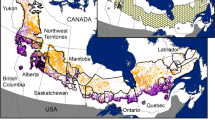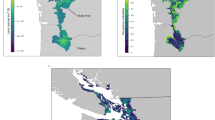Abstract
Biodiversity conservation has been since long an academic community concern, leading scientists to propose strategies to effectively meet conservation goals. In particular, Systematic Conservation Planning (SCP) aims to determine the most cost effective way of investing in conservation actions. SCP can be formalized by the Set-Covering Problem, which is NP-hard. SCP is inherently multi-objective, although it has been usually treated with a monobjective and static approach. Here, we propose a multi-objective solution for SCP, increasing its flexibility and complexity, and, at the same time, augmenting the quality of provided information, which reinforces decision-making. We used ensemble forecasting, considering future climate simulations to estimate species occurrence projected to 2080. Our method identifies sites: 1) of high priority for conservation; 2) with significant risk of investment; and, 3) that may become attractive in the future. To the best of our knowledge, this application to a real-world problem in ecology is the first attempt to apply multi-objective optimization to SCP associated to climate forecasting, in a dynamic spatial prioritization analysis for biodiversity conservation.
Access this chapter
Tax calculation will be finalised at checkout
Purchases are for personal use only
Preview
Unable to display preview. Download preview PDF.
Similar content being viewed by others
References
Alden, K., Read, M., Timmis, J., Andrews, P.S., Veiga-Fernandes, H., Coles, M.: Spartan: A Comprehensive Tool for Understanding Uncertainty in Simulations of Biological Systems. PLoS Comput. Biol. 9(2), e1002916+ (2013)
Ardron, J., Possingham, H.P., Klein, C. (eds.): Marxan Good Practices Handbook. Pacific Marine Analysis and Research Association (PacMARA), Victoria, BC, Canada (July 2010)
Ball, I.R.: Mathematical Applications for Conservation Ecology: The Dynamics of Tree Hollows and the Design of Nature Reserves. PhD thesis, University of Adelaide, Dept. Applied Mathematics, Env. Science and Management (2000)
Balmford, A., Moore, J., Brooks, T., Burgess, N., Hansen, A., Williams, P., Rahbek, C.: Conservation Conflicts Across Africa. Science 291, 2616–2619 (2001)
Cabeza, M., Moilanen, A.: Design of Reserve Networks and the Persistence of Biodiversity. Trends Ecol. Evol. 16(5), 242–248 (May 2001)
Carvalho, F., Ferreira, L., Lobo, F., Diniz-Filho, J., Bini, L.: Spatial Autocorrelation Patterns of The Modis Vegetation Indices for the Cerrado Biome. Revista Árvore. 32(4), 279–290 (2008)
Ciarleglio, M.: Modular Abstract Self-Learning Tabu Search (MASTS) Metaheuristic Search Theory and Practice. PhD thesis, Univ. Texas at Austin, Texas (2008)
Ciarleglio, M., Barnes, J., Sarkar, S.: ConsNet - A Tabu Search Approach to the Spatially Coherent Conservation Area Network Design Problem. J. Heuristics 16, 537–557 (2010)
Coello Coello, C.A., Lamont, G.B., Van Veldhuizen, D.A.: Evolutionary Algorithms for Solving Multi-Objective Problems, 2nd edn. Springer, New York (2007) ISBN 978-0-387-33254-3
de Almeida, S.P.: Cerrado: Aproveitamento Alimentar (Cerrado: Food Utilization). Embrapa - CPAC, Planaltina (1998) (in Portuguese)
Deb, K., Rudolph, G., Lutton, E., Merelo, J.J., Schoenauer, M., Schwefel, H.-P., Yao, X. (eds.): PPSN 2000. LNCS, vol. 1917, pp. 849–858. Springer, Heidelberg (2000)
Deb, K., Sinha, A.: Evolutionary Bilevel Optimization (EBO). In: Proceedings of the 2014 Conference Companion on Genetic and Evolutionary Computation Companion, GECCO Comp 2014, pp. 857–876. ACM, New York (2014)
Diniz-Filho, J., Bini, L., Rangel, T., Loyola, R., Hof, C., Nogués-Bravo, D., Araújo, M.: Partitioning and Mapping Uncertainties in Ensembles of Forecasts of Species Turnover Under Climate Change. Ecography 32(6), 897–906 (2009)
Diniz-Filho, J., Bini, L., Vieira, C., Blamires, D., Terribile, L., Bastos, R., Oliveira, G., Souza, B.: Spatial Patterns of Terrestrial Vertebrate Species Richness in the Brazilian Cerrado. Zool. Stud. 47(2), 146–157 (2008)
Groves, C., Game, E., Anderson, M., Cross, M., Enquist, C., Ferdaña, Z., Girvetz, E., Gondor, A., Hall, K., Higgins, J., Marshall, R., Popper, K., Schill, S., Shafer, S.: Incorporating Climate Change into Systematic Conservation Planning. Biodivers. Conserv. 21, 1651–1671 (2012)
Jain, H., Deb, K.: An Evolutionary Many-Objective Optimization Algorithm Using Reference-Point-Based Nondominated Sorting Approach, Part I: Solving Problems With Box Constraints. IEEE Journal 18(4), 577–601 (2013)
Loyola, R., Lemes, P., Nabout, J., Trindade-Filho, J., Sagnori, M., Dobrovolski, R., Diniz-Filho, J.: A Straightforward Conceptual Approach For Evaluating Spatial Conservation Priorities Under Climate Change. Biodivers. Conserv. 22, 483–495 (2013)
Luck, G., Ricketts, T., Daily, G., Imhoff, M.: Alleviating Spatial Conflict Between People and Biodiversity. Proc. Natl. Acad. Sci. USA 101(1), 182–186 (Jan. 2004)
Margules, C.R., Pressey, R.L., Nicholls, A.O.: Nature Conservation: Cost Effective Biological Surveys and Data Analysis, chapter Selecting Nature Reserves. Commonwealth Scientific & Industrial Research (CSIRO), Dickson, Australia (1991)
McCarthy, D.P., Donald, P.F., Scharlemann, J.P.W., et al.: Financial Costs of Meeting Global Biodiversity Conservation Targets: Current Spending and Unmet Needs. Science 338(6109), 946–949 (2012)
Meir, E., Andelman, S., Possingham, H.P.: Does Conservation Planning Matter in a Dynamic and Uncertain World? Ecol. Lett. 7(8), 615–622 (2004)
Possingham, H.P., Ball, I., Andelman, S.: Mathematical Methods for Identifying Representative Reserve Networks, ch. 17, pp. 291–305. Springer, New York (2000)
Pressey, R.L.: Ad Hoc Reservations: Forward or Backward Steps in Developing Representative Reserve Systems? Conserv. Biol. 8, 662–668 (1994)
Pressey, R.L.: The First Reserve Selection Algorithm: a Retrospective on Jamie Kirkpatrick’s 1983 Paper. Prog. Phys. Geog. 26(3), 434–441 (2002)
Pressey, R.L., Possingham, H.P., Day, J.R.: Effectiveness of Alternative Heuristic Algorithms for Identifying Indicative Minimum Requirements for Conservation Reserves. Biol. Conserv. 80(2), 207–219 (1997)
Pressey, R.L., Possingham, H.P., Margules, C.R.: Optimality in Reserve Selection Algorithms: When Does it Matter and How Much? Biol. Conserv. 76(3), 259–267 (1996)
Rangel, T., Bini, L., Diniz-Filho, J., Pinto, M., Carvalho, P., Bastos, R.: Human Development and Biodiversity Conservation in Brazilian Cerrado. Appl. Geogr. 27(1), 14–27 (2007)
Rodríguez, M., Belmontes, J.A., Hawkins, B.: Energy, Water and Large-scale Patterns of Reptile and Amphibian Species Richness in Europe. Acta. Oecol. 28, 65–70 (2005)
Sarkar, S.: Complementarity and the Selection of Nature Reserves: Algorithms and the Origins of Conservation Planning, 1980–1995. Arch. Hist. Exact. Sci. 66, 397–426 (2012)
Schlottfeldt, S., Saéz, Y., Isasim P.: Sistemas Inmunológicos Artificiales aplicados al Problema de Optimización Multiobjetivo Radio Network Design (Artificial Immune Systems applied to the Radio Network Design Problem). Technical Report UC3M-TR-CS-2009-01, Universidad Carlos III de Madrid (2009) (in Spanish)
Simon, L., Oliveira, G., Barreto, B., Nabout, J., Rangel, T., Diniz-Filho, J.: Effects of Global Climate Changes on Geographical Distribution Patterns of Economically Important Plant Species in Cerrado. Rev. Árvore. 37(2), 267–274 (2013)
Sinha, A., Malo, P., Xu, P., Deb, K.: A Bilevel Optimization Approach to Automated Parameter Tuning. In: Proceedings of the 2014 Conference Companion on Genetic and Evolutionary Computation Companion, GECCO Comp 2014, pp. 847–854, ACM, New York (2014)
Author information
Authors and Affiliations
Corresponding author
Editor information
Editors and Affiliations
Rights and permissions
Copyright information
© 2015 Springer International Publishing Switzerland
About this paper
Cite this paper
Schlottfeldt, S. et al. (2015). A Multi-objective Optimization Approach Associated to Climate Change Analysis to Improve Systematic Conservation Planning. In: Gaspar-Cunha, A., Henggeler Antunes, C., Coello, C. (eds) Evolutionary Multi-Criterion Optimization. EMO 2015. Lecture Notes in Computer Science(), vol 9019. Springer, Cham. https://doi.org/10.1007/978-3-319-15892-1_31
Download citation
DOI: https://doi.org/10.1007/978-3-319-15892-1_31
Published:
Publisher Name: Springer, Cham
Print ISBN: 978-3-319-15891-4
Online ISBN: 978-3-319-15892-1
eBook Packages: Computer ScienceComputer Science (R0)




